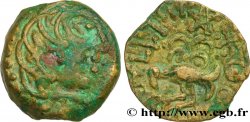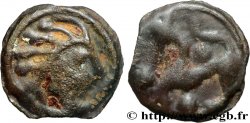v15_0625 - SENONES (Area of Sens) Bronze YLLYCCI à l’oiseau
MONNAIES 15 (2002)
Starting price : 85.00 €
Estimate : 160.00 €
unsold lot
Starting price : 85.00 €
Estimate : 160.00 €
unsold lot
Type : Bronze YLLYCCI à l’oiseau
Date: c. avant 52 AC.
Metal : bronze
Diameter : 15 mm
Orientation dies : 6 h.
Weight : 3,27 g.
Coments on the condition:
Beau portrait. Exemplaire parfaitement centré des deux côtés, laissant apparaître toutes les caractéristiques de la classe 5. Patine verte. Frappe faible au revers et coin légèrement bouché
Catalogue references :
LT.7508 var. - BN.7508-7517 - ABT.- - RIG.320 - Sch/L.742 - Sch/SM.- - Sch/D.- - Sch/GB.- - BMCC.152
Predigree :
Cet exemplaire provient de MONNAIES II, 21 juin 1997, n° 260
Obverse
Obverse legend : ANÉPIGRAPHE.
Obverse description : Tête à droite, les cheveux divisés en grosses boucles stylisées, tirées en arrière ; devant la bouche, un annelet pointé entouré d’un annelet perlé.
Reverse
Reverse legend : [YLLYCCI].
Reverse description : Oiseau à gauche ; derrière, un pentagramme et un Y ; derrière, deux annelets centrés ; sous la queue de l’oiseau, une croisette aux extrémités bouletées accostée de quatre globules ; un globule sous le bec de l’oiseau.
Commentary
Sur cet exemplaire, la légende est mal venue à la frappe, mais la pièce appartient bien à la classe 5.








 Report a mistake
Report a mistake Print the page
Print the page Share my selection
Share my selection Ask a question
Ask a question Consign / sell
Consign / sell
 Full data
Full data



